Stories from Styx: Hades and Persephone
A deep dive into the anthological musical Stories from Styx's first installment, created by Casper Fox, now on all streaming platforms, called Hades and Persephone.
Stories from Styx is a musical anthology, or preferably said, an anthological musical, whose first installment was launched this Spring. It is a project created by Casper Fox. It represented the natural follow-up of his fascination with musicals, world in which he entered in 2024. Casper has a YouTube channel, where he reacts and analysis musicals, songs or tv series. He also has, a joined channel, with his friend, Mortius, where they create content together.
Why do I say it is a musical anthology? Because, the idea was the following one. Casper, fascinated by Hades, the God of the Underworld, so much so that he gave an already popular nickname for Poseidon, “Wet Hades”, wanted to create a musical, where separate stories took place but they all had two things in common.
First and foremost, they were related to the Underworld, where the action took place or the follow-up. Secondly, they had Hades as a character. Of course, the main source of inspiration was mythology, but also pop culture. But more than that, this musical creation of his has no central story in which we have a central character or a few which develop along the way. It is a collection of myths, woven together by the waters of the river Styx and by the might of the Underworld.
The first installment of his project is out now on all streaming platforms, with its release on March 20, the official beginning of Spring(YouTube, Spotify, Apple Music).
What is interesting to note, in this first installment, is that while the idea is to listen to the whole, I feel the need to divide it, to better understand it and its structure allows us to do very easily. The first three songs are the ones that establish the universe in which we enter. The last three focus on the relationship between Hades and Persephone.
This is why, the title of this first concept album is Stories from Styx: Hades and Persephone. Another interesting difference will be to compare it with the second part, which will come out this year, hopefully. The second part or second concept album, will have each song be an adaptation of a myth, which, if you ask me, is far harder to do than what Casper attempted here.
The first three songs, Titanomachy, Shades and In the Underworld Now, as I previously mentioned, have the role of serving as architects for the world we step in.
Titanomachy, the first song, reminds us of the legendary war, that lasted a decade, between the Titans, led by Kronos and the Olympians, led by Zeus. The ending was that the Olympians became the governing force of the world. It was a battle between generations, between freedom and order represented by the gods against tyranny and chaos, in the form of the titans.
The most well-known source, recounting this immemorial conflict is Hesiod’s Theogony, an epic poem written somewhere between the eight and the seventh century B.C. Hesiod offers in it a detailed genealogy of the gods, tracking their origin from the primordial chaos until the ascension of the Olympians. This text is not just a simple mythological achieve but a fundamental writing which reflects the old Greek cosmology and the creation of its pantheon.
I would dare to say, it is also a reminder of the cycle of our deeds and the reaction generated from them, excluding their fairness. Kronos was a hero himself once, stopping his father, Uranus and banishing him. He then freed his brothers, the primordial giants and cyclopes from Gaia’s womb, where they were trapped by their father, only to trap them again, this time in Tartarus. He brings about what is known as “The Golden Age”.
But Uranus, shortly before his powers leave him, gives Kronos a warning, telling him that he will endure a similar fate. He is haunted by the possibility of the fruition of the prophecy and starts eating his children as soon as Rhea, his sister-wife, gives birth to them. This is how Hestia, Demeter, Hera, Hades and Poseidon get into his stomach. He was afraid of losing his power, just like his father before him.
Rhea, his wife, justifiably angered by all this, seeks Gaia and with her help, she saves Zeus. You must understand, Gaia was a primordial in her own right, the avatar of the Earth itself, someone with far more knowledge and power than even her husband, Uranus. They make a boulder look like the child and he is eaten in its place. Meanwhile Zeus grows up, trains and gets ready for a revolution.
A nice touch to this musical is the explanation for which Poseidon wears glasses in Stories from Styx. First, the actor playing him does and the art for the character reflected that. But Casper came in with an additional something. He says, in his mind, when Poseidon was eaten by Kronos, the titan’s stomach acid hurt his eyes. Hestia, when she sees the boulder that came down, when they were expecting Zeus, forges from the rock a pair of glasses for her weekly eyes brother.
This first song covers a great temporal period. We start with freeing the gods by Zeus. In the myth, the future God of Thunder, with the help of Metis, administers Kronos a strong potion or a potent drug, to make him regurgitate his children.
This is also recounted by the Muse:
„Hades sees light for the first time when his father Kronos spits up the king of the Underworld along with Poseidon, Hera, Demeter and Hestia”
Then we go to Zeus who seeks the help of his brothers and sisters to start the war and win it. We go through the final fight against Kronos, and it ends with the the big three (Zeus, Hades, Poseidon) diving the world amongst themselves. Do these last events look like a campaign and a boss fight in a video game? Yes! Where Kronos is the final boss standing between the heroes and their victory.
A particular thing, I feel the need to mention is the fresh take on Hera. We rarely get to see the goddess or hear from her, in those early times. Here we have a young Hera, which immediately joins Zeus’s cause. She falls in love with him and is the first to be by his side. She is unburdened by all those events that came afterwards, which turned her into the Hera we know, the scheming, revenge seeking Queen of the Gods.
She is played with such candor, a lot of spirit and gentleness by Ellie from Ellie and Knox. Ellie’s Hera, is the young maiden goddess, who harmonizes with her future husband to convince her brothers and sisters to fight and who afterwards is ready to take her place, beside her husband.
We will be known
Gods on the throne
Brothers and sisters never to die
So please stand with me now
And claim our father’s final goodbye
Another important reference from the myth is seen in some of Zeus’s lyrics, regarding his call to arms.
I’m sorry that your birth is bathed in blood
But now we’ll drown these brutes with a flood
Exclaim and reclaim the cyclops grants us strength we must not comply...
The cyclops mentioned, are the three original cyclops, children of Uranus and Gaia, which, in the war fought beside the gods once they were freed from Tartarus by Zeus. I am speaking of Srges, Steropes and Brontes. They become the blacksmiths of the gods. Perhaps their most significant creations are Zeus’s iconic thunderbolts, Poseidon’s trident and Hades’s Helm of Invisibility.
After the war, the world was divided and the dawn of the era of the Olympians came about. In myths, a divine lottery was done, where the Fates guided the process and will determine what domain each of the brothers will get. Zeus, got the biggest straw so to say, so he got the sky and air and became the leader of the gods. Poseidon, with the second straw as length got the waters, becoming the lord of oceans and seas. Hades, even if he was the oldest, age wise, gets the shortest straw and receives the dark lands of the Underworld, leading the dead and keeping the secrets of the realm.
The Earth and Mount Olympus, which served as the base of operation of the gods during the war, became their stronghold, and these two became neutral territories.
This fact is reflected at the end of the song, when the Fates, in SfS decide over which domain each god will preside over. The process is followed by each god confirming the result. At the end, we have a warning launched against the possible usurpers, put out in the world by all gods which now knew their roles and were sharing their gifts and were ready to rule, as it was their birthright.
A new dawn begins, an era ends
Tremble before the Olympians
Before moving on, I will remark that, if you listen to the fantastic Peter Barber, who plays Zeus with an extraordinary power, he convinces you of his power and of the victory ahead. Everyone, me included, once I listen to his plea, will be ready to follow his lead into battle. Peter Barber is an actor, a great opera singer and a vocalist with a very special voice.
His Zeus while young, is a god of order, control, calm and a leader of a new direction, a force for the new needed to transform the cosmos. Follow his voice and let yourself be embraced by the energy he puts out trough which he calms his sibling’s doubts. And then be ready to be empowered and go on with your life with newfound force and courage.
One final thing about this Zeus is he also represents a new time, the time for the cosmos to know and be governed by him and his siblings. His lines while encouraging his siblings are:
Our destiny’s still ours to claim
Don’t live in the past, don’t be the same
We’ve put our first remark
It’s time to leap!
This is also a reference of him as a force that drives the world forward, a force of change, this is why he instinctually take charge and leads the gods in the war if we exclude the practical side of his experience of the world, one that in its renewal path is blocked by the old way, the Titans and especially Kronos. Him landing the last hit on Kronos, the titan governing time signifies as much, also that the old order is broken and time for something new to be put in its place has come.
And now to finally add the song, so that you can listen to it before we move on.
The next two songs, Shades and In the Underworld Now, define Hade’s domain and how it is organized.
A small but necessary intervention before we go on. In all songs, the Muse is present. Her role, similar to mythology, is to tell us these stories, to bring additional information, to clarify aspects, before the characters trough the artits’s voices bring them to life. This Muse, with a voice made for radio, or to use a more contemporary reference, with the voice of a perfect podcast host, tells us what she must and then uses her powers, takes the audience and transports us in the middle of the events, making us live them. She is played by the great Keinya Denise.
I felt the need to do this necessary intervention, because at the beginning of the second song, Shades, she has one of the most important series of remarks from all songs. She says:
Gazing upon his new domain, the king of the Underworld, could not help but feel ambivalence
Every soul, that includes you and I, will, some day rest within his domain
This is a great clue that helps us gaze into Hades, the SfS Hades and how he evolved from the Titanomachy and forward. I will get back to that later. But this bit, more importantly, speaks of his might. Even if he is destined to hold the reigns over this kingdom that does not seem much at first, he carries a burden and responsibility, maybe heavier than Zeus himself.
We are reminded here, gently, that all souls, of the humans in the audience, generally speaking of all humans or of beings such as the Muse, theoretically immortal, this also means the gods, will get eventually in the god’s domain, sooner or later.
The song is a gentle and melancholic ballad, which allows us to gaze into Hade’s soul.
Next, I will mention a few details regarding the geography of the Underworld, so that we get a better feeling of what Hades was ruling over. I will also briefly talk about the soul cycle in those ancient times.
Hades’s domain, sometimes called Erebus, was thought to be at the end of the world, beyond even the Oceanus’s River which encompassed the world. The Elysian fields or Tartarus were not yet associated with the Underworld at this point. It was a bleak world, without joy, a world of darkness. Later, the concept of the afterlife developing, the two territories mentioned earlier became associated with the realm. Now, the gates were guarded by Cerberus, the immense and fierce three-headed dog, who had a double duty. He had to ensure no soul escaped the Underworld and that no mortal would enter before its time.
We have Asfodel’s fields, a neutral zone, which serves as a resting place for average souls, who had neither an extraordinary heroic nor wicked life. Taratarus was the infernal abyss which held the titans and the souls of the dammed. The Elyssian Fields, sometimes called the Isles of the Blessed, were for heroes and good people with an exemplary life, moral-wise.
These Fields offered a paradisiac existence of happiness and peace, everlasting. The Fields of Mourning were the resting place for those who were destroyed by unrequited love. Then there are the 5 main rivers. Styx will be addressed later, when we get to the third song. The other four are: Acheron (sorrow and grief), Cocytus (weeping and mourning), Phlegethon (it led to Tartarus) and Lethe (forgetting earthly life).
This is what Hades inherited.
As for the soul cycle. In the beginning, when someone died, no matter what type of life it led, his essence was separated from the body. This essence was called psyche and it was sent to the Underworld. There the essence lost its particularities, the personality, in a word the identity. How did souls get there? We’re about to find out! But before any of that, give a listen to Shades.
Now we get to what I call the first banger of this musical project, In the Underworld Now. If the second song, in terms of timeline, takes place right after the first, we have a time skip before this one. When we hear the finger snaps and the rhythm, we are transported into a jazz lounge, where a jazz band, “Hades and the Underworldies of Styx”, reveal to us how it all works. The Muse lets Hades and the three judges(half of six, hehe) to teach the public how this mighty god organized his world.
This song is rich in names and mythological references. Hades here appears as the king who oversees the souls being judged, without interference. His three judges are Minos, Rhadamanthus and Aecus. All three, once mortal kings, sons of Zeus, were elevated to this crucial role as a reward for their rulership. All were an example of fairness who held the law above all else. Their never ending job was carried out, according to various accounts, in front of Hades’s palace or in the Plains of Judgement, where they decided what will happen to each soul of the recently deceased.
The first we get to know is Aecus, played by JP Warner, with his sweet but fair voice. JP was also the one who managed the project’s musical production. I will not say what each king speaks of, but I will refer to some mythological aspects for all of them, to be able to make a comparison with the portrayal here, once we listen to the song. Aecus, it is said, was judging the souls of the people of Europe and he held the keys to the Underworld.
Then we have Rhadamanthus, brought to life by the somehow etherical voice of Patrik Sudak. Rhadamanthus was responsible for the judgement of the souls of people from Asia and he was supervising the Elysian Fields.
Last, but certainly not least, probably the most well known and important amongst them, Minos. He was invested with the ability to have the final say when the other two were in disagreement. Some sources indicate him as being responsible for the souls of the greeks. His role and authority could not have been better represented than by the low and imposing voice of Rashad Watty.
We heard of the Fates before but here we get to hear them. We are also told about the River Styx and about the boatman who carries the souls on his boat. The Fates are three women, sometimes represented as three old wise ones, often referred to as sisters. They personify destiny itself.
They are: Clotho (spun the thread of life on the spindle, it was the beginning of life), Lachesis (measured the thread of life with her staff and determined what events would happen to that being) and Atropos (cut the thread of life with her scissors, chose how each person would die). Their decisions were absolute and final, the gods could not intervene.
Styx, is one of the 5 main rivers flowing through the Underworld. He is also associated with a Titaness with the same name, the daughter of Oceanus and Tethys. Together with her children, she sided with the Olympians in the war. As a river though, Styx represents hate and unbreakable promises.
It served as the last threshold between the world of the living and the world of the dead. As the ultimate guarantee of divine promises, it brought terrible events upon those breaking promises made over its water. Zeus himself would often use the waters to settle conflicts between gods. In SfS it is a road for us to get into the home of Hades.
The ferryman who transported the souls in Hades, getting them over Acheron and Styx, was Charon. He is said to have been the son of Erebus, the god of darkness and Nyx, the goddess of the night. But his services were not for free. He was one of history’s first entrepreneur, albeit in a very weird context.
Anyway, he needed to be paid an obol(a small silver coin, traditionally placed in the mouth or under the tongue of the deceased). Whoever didn’t have one, was cursed to spend a century on the solitary banks as a punishment due to the family or friends negligence regarding the mortuary ritual. After that, the soul was granted passage.
The chorus composed by Casper and repeated by his three judges and the Fates, reminds us constantly that we are, finally, in Hades’s Underworld and not in that unorganized territory he inherited. He was the absolute master of the place and being who he is, he shaped it into its current form by creating and upholding its laws. And now it’s time for the discussed banger!
The last three songs, Crossroads, My Persephone and There is no Name, together, explore the most popular myth regarding the god of the Underworld, the myth of Hades and Persephone. All three are bangers, or a more modern term would be bops.
The first is a very strong song in terms of music with strong rock influences, the second is a love ballad and the third is a devastating ballad which must be replayed repeatedly. Throughout these songs we meet Persephone and we get a deep dive into Demeter’s perspective. I will say here already that There is No Name, it’s my favorite song from the entire album.
The myth of Hades and Persephone is very popular and everyone who studies mythology or finds themselves in this cultural area will stumble upon a variant of it, sooner or later. The most renown source which registered the events is the Homeric Hymn of Demeter. Persephone is Demeter’s and Zeus’s daughter, the goddess of Spring. She is kidnapped by Hades, in most versions from a gorgeous flower field. Hades had been smitten with her since he first saw her and wanted to make Persephone his queen. I will continue recounting the events as we go on.
Crossroads is the fourth song and is the song of Persephone. She is played by the incredible Teagan Earley. Trough the lyrics, the musical arrangement but more than anything trough Teagan’s voice, which is literally out of this world, she tells her story, which is complex. She is young and spends her days in the field prepared by her mother, tending to the flowers, wearing a beautiful white rose in her hair. The rose being the royal flower, a flower with strong spiritual ties in european cultures, its equivalent in Asia being the lotus, the color signifies her status as a young maiden.
What Stories from Styx brings is that we meet Persephone who is alone, almost isolated and being trapped in her thoughts. Her reflections that spark through Teagan’s voice offer us a clue to her inner conflict. Despite her privileged status and the deep love she feels for her mother, she feels alone and left behind, her mother doing anything she can to guard her daughter, a thing that brings her sorrow. She is constantly anticipating her destiny and sees herself as a being at the crossroads.
Before going over the significance of the crossroads, it is interesting to point out how Persephone, reflecting on her impact on history, if she will be remembered and others’s perceptions of her, should make us go back to the young Hades in Shades. He also worried, back then, about these aspects, the common worries of youth, especially of beings of their proeminence. This creates, from the beginning, a sense of mirroring between them.
The crossroads is a symbol of important decisions, usually life changing, ever-present in mythology, mainly in hero myths. Inside Persephone there is a storm, a battle between who she knows she is and who she has a feeling she can be. This will make her wish more and more to explore her potential when the time comes, in the meantime drowning in her own resentment and despair. This is where the fundamental change from the myth occurs.
She is not scared when she hears Hades, she is curios and uses the opportunity to escape her chains, giving her life up for an unknown which she is ready to tackle together with this man. She feels whole when she is around him and we can feel that immediately when their voices meet and even more so when their eyes do.
Near the end of the song, Teagan reveals her excellent voice control and her vocal prowess by unleashing a vocal explosion. Initially, that specific part was not that high, but Teagan enjoying a challenge and feeling comfortable with her abilities made the conscious decision to go higher. The result? An excellent display of vocal might which had a far greater impact than if she did it as it was intended.
That high note is a belt, a middle belt for her which is comfortable within her range. She did a Tik-Tok video explaining all this and how it is very dangerous to sing such a note with a full belt or simply to do it repeatedly because it will damage the voice over time. Even if it might seem like a scream, it is not.
The next song is the love ballad My Persephone. Here, Teagan got to write her character’s lines. Everyone who listens will see how it fits perfectly within the structure and tone of the song. Persephone’s verse indicates a more mature side of the character. She isn’t naive and even if she is embracing Hades’s proposal to be his wife, speaking very well about her future husband, describing him as if she always knew him, she tells him that she cannot be anymore than she is.
She is a real being, and not an ideal, a purpose or a reflection of Hades’s wishes. She must be treated respectfully, with care so their love can bloom. The weight of freedom in all this is crucial, especially considering her previous state of feeling imprisoned.
Teagan managed to offer trough her voice, breathing life in her verse, a dignified image of Kore turned Persephone. She does not want to invest in a relationship which isn’t serious or real, despite the troubles such a deep connection might bring.
She tells Hades that:
Just keep me free
And I will be
Persephone,
Kore turned Persephone
Let’s discuss this last bit. Before her marriage to Hades, her name wasn’t Persephone. She was associated with the term kore or rather with the name that derived from that, Kore. Kore translates into maiden or young girl. This is also how Hades, at the beginning of the song addresses her, before his marriage proposal:
Maiden bring me the light
That my Underworld cannot fathom
These two sentences bring another layer of depth to their relationship, which can be thought of in terms of one mirroing the other and vice-versa. Kore is a light bringer, a life bringer, bringing hope to a world of darkness and finality(remember the Muse’s remark in Shades). This world needs her like the world above needs air. But this world, Hades references as being his realm, is himself. If he has an honest and fruitful relationship with her, his world can go on and they can both rule as just and balanced monarchs.
This term, kore, turned into an identity, shows us her previous status, as a young unmarried woman and reflects her relationship with Demeter, Kore being her beloved daughter. In this song, she is offered a new name or title, in a word, a new identity by her husband to be. Here she shifts from maiden to mature woman, the wife of Hades and the Queen of the Underworld.
This is another significant departure from the myths. Originally, Persephone eats some pomegranate seeds while in the Underworld, being famished but aware of the consequences of such an act. No being from the world above can consume underworld food without ending up trapped there. In Stories from Styx, this aspect is not directly explained, but what it is insisted on is that she wishes to remain there, out of love for the one she chooses.
I hope in the future we will get to have Teagan back to witness Persephone as the powerful Queen of the Underworld that she is. As a powerful figure of the Realm of the Underworld. According to Homer, she brought to fruition the curses the mortals cast on the souls of the deceased. According to other sources, she had the power to send frightening beasts to punish those who wronged her, such as Adonis.
Her title, very often, after assuming the mantle of rulership is “the dread Persephone”. All these have great potential to come to pass here, especially since Teagan alluded to them by singing in a lower key, as now, Persephone, the queen ready to unleash all the forces and storms inside her, as she herself states.
Let’s move now to the boss, the king, the shah cause’ we’re in the Underworld na’!
Casper Fox didn’t only create this universe, but he also plays Hades. His voice changes significantly between the first five songs, especially between Shades and In the Underworld Now. Casper has an great voice and this must be said, especially when we hear Casper’s voice go up when he accepts his role as ruler of the Underworld at the end of Titanomachy, after being the second to join the fray of revolution.
It is done very controlled but also full of intensity and power. His youth is also felt, before, when he escapes with his siblings from Kronos’s stomach and witnesses the beauty of the world for the first time since birth while voicing his doubts about Zeus’s plan and the possible fate ahead, should they fail. Contrary to Zeus, he is older but less experienced. Zeus grew up in this world and trained and knew his way around, not to mention his own power whereas Hades was a novice in both.
Then, during Shades, his voice is very sensitive and gentle, showcasing the immensity and weight of the role he has to fulfill. Casper here portrays Hades’s worries about his destiny, his possible memory fading in the storms of history and the fragility he displays for the first time, because just now he has time to think, reflect and breathe. During these first two songs, we get a young Hades, who is very powerful but possibly lacks the emotional balance to be the ruler he is supposed to be.
Casper’s voice goes slightly lower in In the Underworld Now and is more stable, less shaky. He allows himself the luxury of feeling good while carrying out his never-ending duty after a tireless work worth eons of organizing that very dimension.
When he meets Kore, he sings as her very own reflection, in a lower register, showcasing he is the subterranean element of the story. The public must never forget about this. Simultaneously, he sees himself in the maiden. In My Persephone, he is sweet, tender but proves he does not have the experience of love or relationships and even if millennia flew over him, he was buried in his work, and now faced with this situation he does not know how to behave or react to this lady he irremediably fell in love with.
Casper finished writing and composing for this project in a few months, allowing himself the time to cast and to work with JP Warner at the finishing product. It is a short yet very compelling project, and we must also keep in mind the immense work that was done for such a short time span.
But to also bring some mythological context, a parallel if you will, Hades, aside from being the master of the world that will inherit his name, being a reflection of himself(remember the lyrics from My Persephone), is the god of wealth hidden inside the earth, such as precious metals. This is very well reflected by his roman name, Pluto.
I feel that pop culture, especially in the last 30 to 40 years, starting, perhaps, with Hercules’s movie from Disney, had a negative impact on him. Most of the time he is portrayed as a villain and that is, and I am not sorry to say, while entertaining, not favorable.
Hades is only feared due to his power of the realm he rules and his association to death. But he is a complex and fair ruler which is greatly reflected in Stories from Styx. A symbol of his divine power, found on the cover of this project is the bident, here displayed as more of a royal scepter.
Casper is very respectful with his portrayal of Hades, wanting only to understand him better and to explore his multiple facets. What we see in Casper’s Hades, aside from what I have written above, are original elements such as his feelings, his thought process, his fears which through the creator’s voice he brings out into the light. These aspects are not really that developed in myths. Not so openly and often, anyway.
In the sources, we mainly see his actions or they are described to us, his reactions to situations, we hear him speaking but we are not allowed to grasp his thoughts, what he feels when all those happen. Casper most probably took note of all that and shaped his Hades with this new level of depth, necessary for a being such as him.
We are reaching the end, the last song, There is No Name. First of all, what a jewel to end this concept album on! Casper respected the saying of ending on a high note. And by Demeter, what a note that is! It is so profound, sad, powerful, and haunting that I do not think words are enough to describe it. Allow yourselves to fully experience it while listening to it. I will try to offer some thoughts on it, though, addressing its most important aspects.
I can presume something here, that despite that weight and gravitas of the song, it will have a therapeutic effect on the listener. It will be useful to us in our own lives, granting access to the highest and most raw form of grief and fury, that of a mother. This is Demeter’s song. Jennifer Glatzhofer is Demeter! Full stop. She doesn’t play a character, she lives it.
In the Homeric Hymn of Demeter, we learn what the goddess does when her daughter vanishes. We observe the force and despair that she unleashes but we do not get to hear her directly expressing it. This, thankfully, changes here, it is a first for the goddess. In this song, Zeus also comes back, briefly, the first we hear from him since Titanomachy.
Let us check our mythology before going forward. Demeter is the goddess of agriculture but also a fertility one. She is Zeus’s older sister and they have Persephone together. Starting with her daughter’s birth, Demeter changes profoundly, becoming overly protective, capable of unimaginable fury, ready to do anything, to keep her beloved girl safe.
She acts always, at least in her mind, with the best interests of her beautiful yet naive daughter at heart. Nothing is out of the realm of possibilities to fulfill her maternal role and one consequence of that, unfortunately for her daughter, is her isolation.
Checking different sources, we find out, that, before Kore was kidnapped by Hades, Demeter either opposed to Hades’s marriage proposal or she refused the proposal when it was offered trough Zeus’s interference. When she finds her daughter is missing, Demeter becomes furious, is ruined by sorrow and grief, her feelings knowing no bounds. In some versions of what happened, she goes to Mount Olympus, seeking the council of her siblings, explaining the situation from her perspective. She is ignored, the same way she is in the song, where we get to see her react by saying:
I will not be convinced
I will not stand here flinched
The Fates scream for vengeance
While I’ve barely pinched
In other accounts, she does not go to Olympus and leaves after her daughter immediately. What is clear is that she refuses to consume nectar and ambrosia, retreating shattered from the divine realm. The earth becomes sterile and famine spreads.
Zeus, acting this time on the mortals’ s behalf finds and confronts her, asking her not to confuse her feelings for her daughter with her divine duty. Here, Zeus proves himself as King of the Gods and overseer of the mortals’s affairs who still holds the order he installed together with his siblings above all else. As luck, or the lack of would have it, Demeter threatens him that if her daughter is not returned to her she will make sure the earth will become barren for eternity, which will lead to humanity’s disappearance. This part of the myth is also portrayed in the song, when Zeus says:
Eternal winter
Crops are dying
Goddess of Harvest
Hear them crying
Now we get to the chilling reply that Demeter provides. This answer is full of resentment, some people could say is malevolent or downright macabre. It reeks, in a sense, of a primordial darkness that will engulf everything.
We have to remind ourselves that she is a mother, first and foremost, which cannot fathom the thought of her child not being with her anymore and which chooses to destroy everything in her way. By doing that she displays the monstrosity of a mother’s unleashed suffering, being ready to turn the world upside down and everyone, no matter the shape, will taste her resolve. In the song, she says:
Let them rot, God of Thunder
If I’m not mistaken
That’s what you told me
When my daughter was taken
The ending is the one we all know, where Zeus decrees that Persephone be returned to Demeter but he finds out that she ate the pomegranate seeds, and also according to some sources, that Persephone and Hades live a real love, especially if we take into consideration the role Zeus might have played in all this, he decides on a solution of compromise. Persephone will spend a part of the year with Demeter and the other will be spent with Hades, ruling the Underworld.
And this, ladies and gentlemen, is how we got our seasons. When Persephone comes to the world above, her mother being extatic, nature blooms by their powers. When Persephone leaves, Demeter is once again grieving and she withholds her gifts until next spring and so come fall and winter.
In this anthology we have some additional elements. It is clearly stated that Kore, the Persephone of the beginning, misses her mother but she loves who she became and loves Hades but she cannot let Demeter destroy all life by starving it. But she also feels she can’t live permanently in Hades’s world. In a way, we are shown, she retains some of her maiden aspects.
Here there is no decree, but a bargain between the sides that stops the conflict. To briefly get back to the symbolism of crossroads, Kore is Persephone now but by her realization that she didn’t completely shed her maiden characteristics, she is not forced to choose one road (Kore) or the other (Persephone) but a balance between the two. A balance that ensures their harmony within one being.
So, everything is well when it ends well, right?
Not really! Jennifer who is Demeter, starts this song sad and as time passes and the song progresses, her untamed, primordial fury and hatred against Hades come out and we can see them take charge. She repeats obsessively how all possible suitors of Kore are disgusting low lives who have no right to touch her, but her biggest problem is her brother.
This man, she once fought alongside takes her child away from her irrevocably. Everyone is against her, but the main difference between her and a human being, is that she is a god, a vital one at that for humanity’s survival and thrive and they will all feel her fierce bite.
Demeter says as much in the song:
I will rip through the realm ‘til there’s nothing but pain
“Demeter,” they say, “why see it as bane”?
What always impresses me regarding this song is an inalienable truth that holds today just as heavy as it did back then, which is, that there is no bigger pain than a parent losing their child. Take that, multiply infinitely and you get how a mother in such a situation feels. Of course, Kore is not dead and Demeter constantly neglects her own’s child role in the scenario she faces.
She feels abandoned, a mere shade that covers the world, without an identity or purpose when her daughter is taken from her and she starts blaming everyone else, willfully ignoring Kore’s part in all this. For her, the woman, is still her little girl which tends to the flowers in the garden that she created for her. She doesn’t see her as Persephone, in the sense of her maturity and willingness to change.
Follow her calm voice before she lets loose in the song, what she says, and then how all that crystalizes into those intense feelings she can’t let go of. This is best felt when it comes to the chorus. At the beginning of the song, it is stated that” There is no name…” in a very soft manner, almost anticipating what comes next.
During the first chorus, the guitar and the drums intervene and highlight for the audience the intensive state of mind she finds herself in. The last chorus, when everything is theoretically solved, that blast, when all instruments create a space of sound almost untamed together with the voice of Demeter, show how she understood the deal. She will never be happy with this, she doesn’t do half-measures, and the world will get to experience her rage and grief time and time again, come each winter.
As I was previously stating, things don’t end well, not entirely, because even if Demeter agreed to the deal with Hades trough Zeus, she will never be at peace with the idea her child is not hers anymore. Unfortunately Demeter displays a dark aspect of motherhood, an unfortunate trait, that of identifying with her offspring in her entirety.
She is someone who cannot comprehend that her baby which she took care of and tended to grew up, matured and needs to tackle life herself. Demeter’s excessive protectiveness is not helping Persephone. But we have to digress because she acts and reacts according to the limited information she has at the moment the disaster unfolds for her.
Two more things. The first is related to the title. The title of this song reflects, especially when sang by Demeter the disgust to pronounce the name of the one which is responsible for her sorrow or those of the ones that tried to be her daughter’s suitors. All poor unfortunate souls in her view. On the other hand, she uses a lot of strong words when referring to all of them.
Why do I insist? Names are very powerful things. They give an identity and purpose to a thing or person. It is the goddess’s way of disowning them of their identity, to categorize them as unworthy to wield a name. For her, they are nothing, no one.
Then, because I addressed the names, I want to draw attention to the way Demeter speaks her daughter’s name. She calls her daughter, Persephone, indicating she understands her new identity, with which she isn’t in agreement, but her pronunciation is full of protection, sadness and maternal force, especially when explaining who she wants to guard Kore from. Compare this to the way Hades says her name, in My Persephone, the previous song, the love ballad. Hades addresses his wife with curiosity, delicacy, romantic love.
I want to congratulate Jennifer for her portrayal which makes me all the time, even if I listen all the songs in order or go directly to hers, to live in those moments that fury, the irrationality and the capacity for destruction with which a mother has in herself and unleashes in dangerous or unbearable situations. Give this marvelous thing a listen!
These six songs are part of the first installment of Stories from Styx, which I advise everyone to listen to, in order, at least once. It is impossible for me to believe that anyone will not have a favorite to which you will return to periodically.
The whole cast and the team behind the project and the visual artists which contributed must be congratulated for their excellent work!
In the end, I will leave you with the official animatics movie of the story from which I extracted all the art that I used.

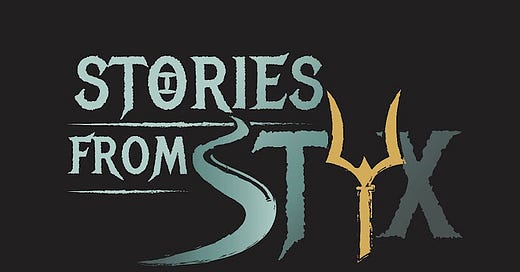




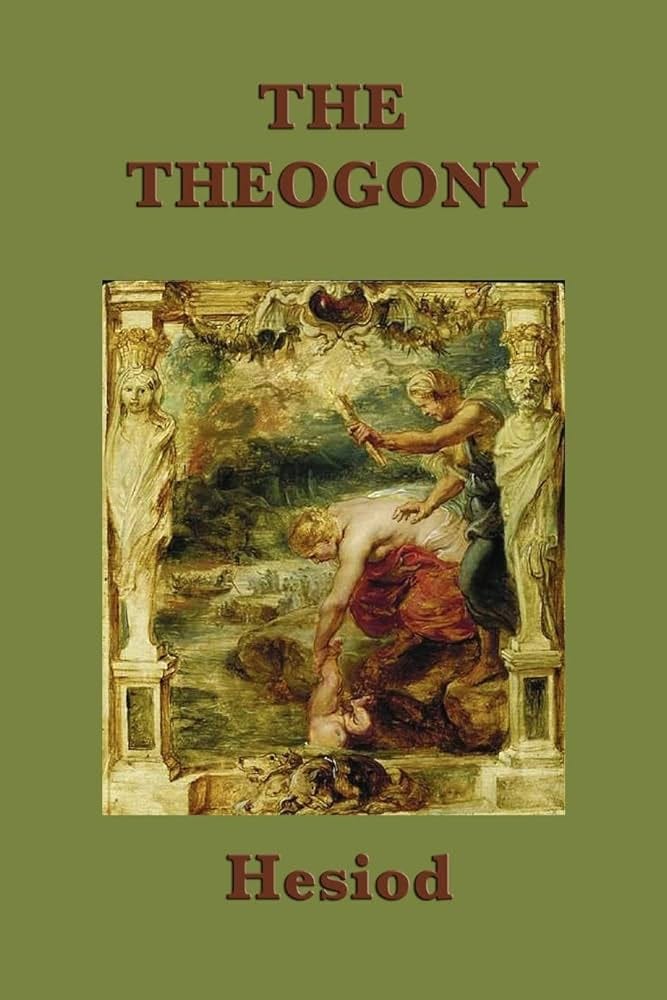
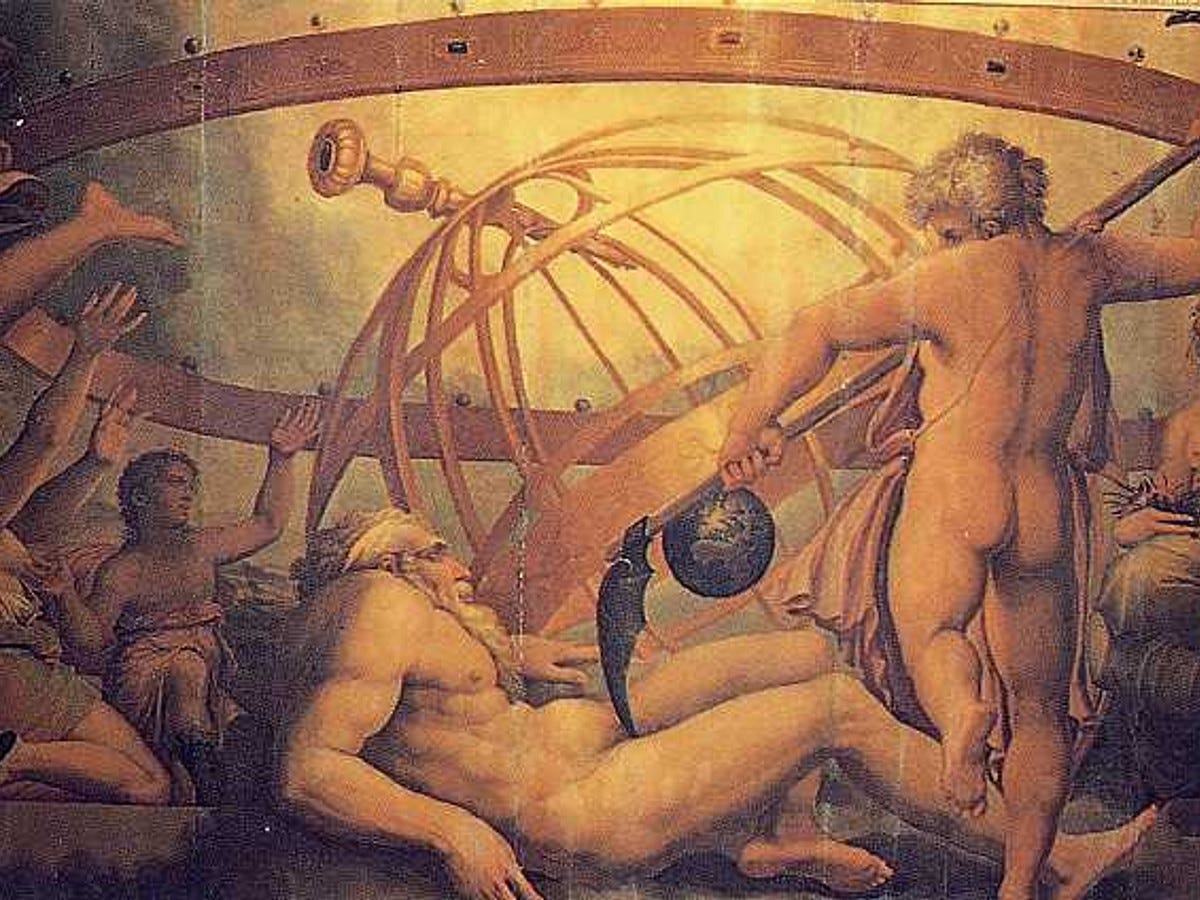





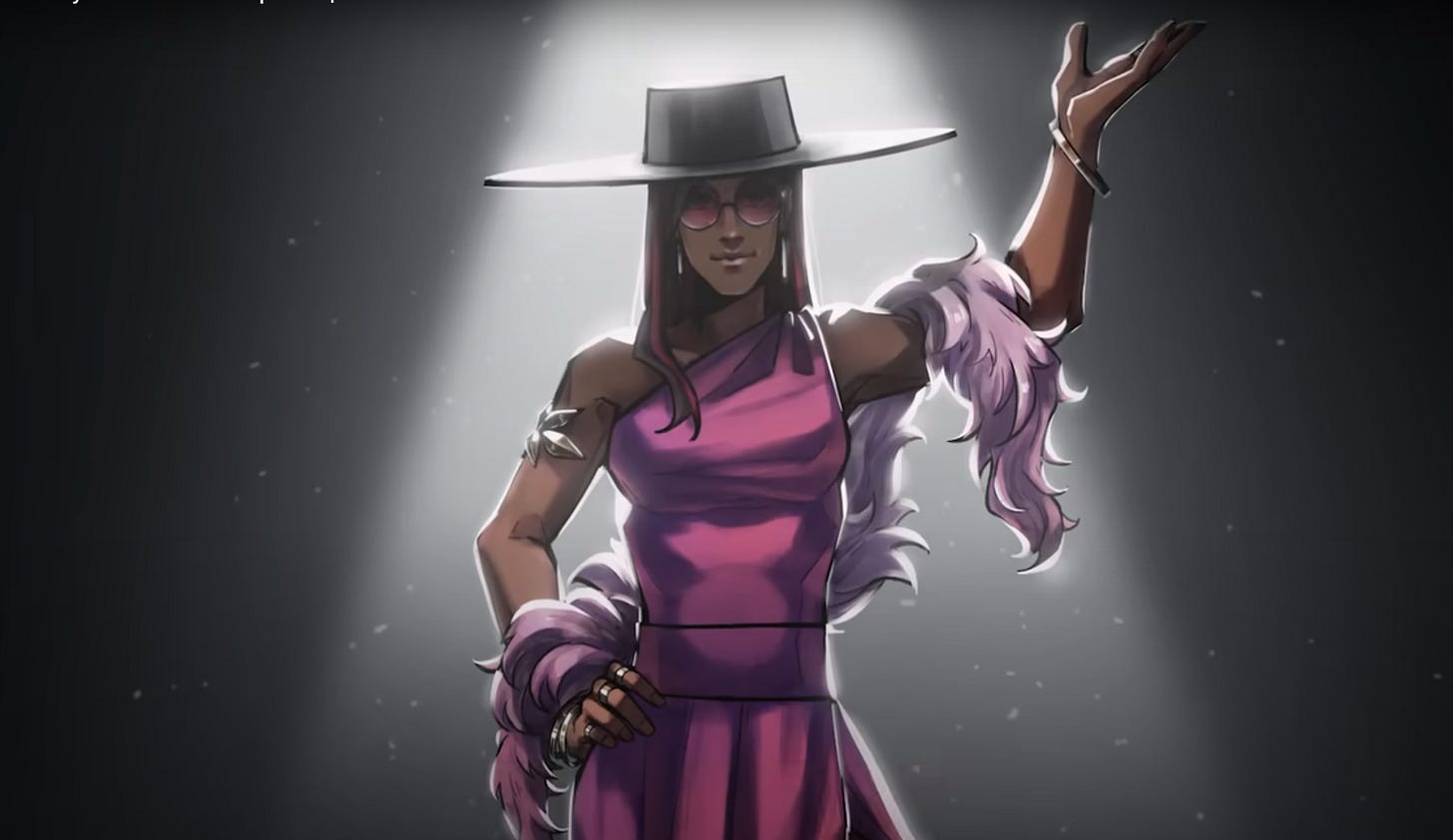

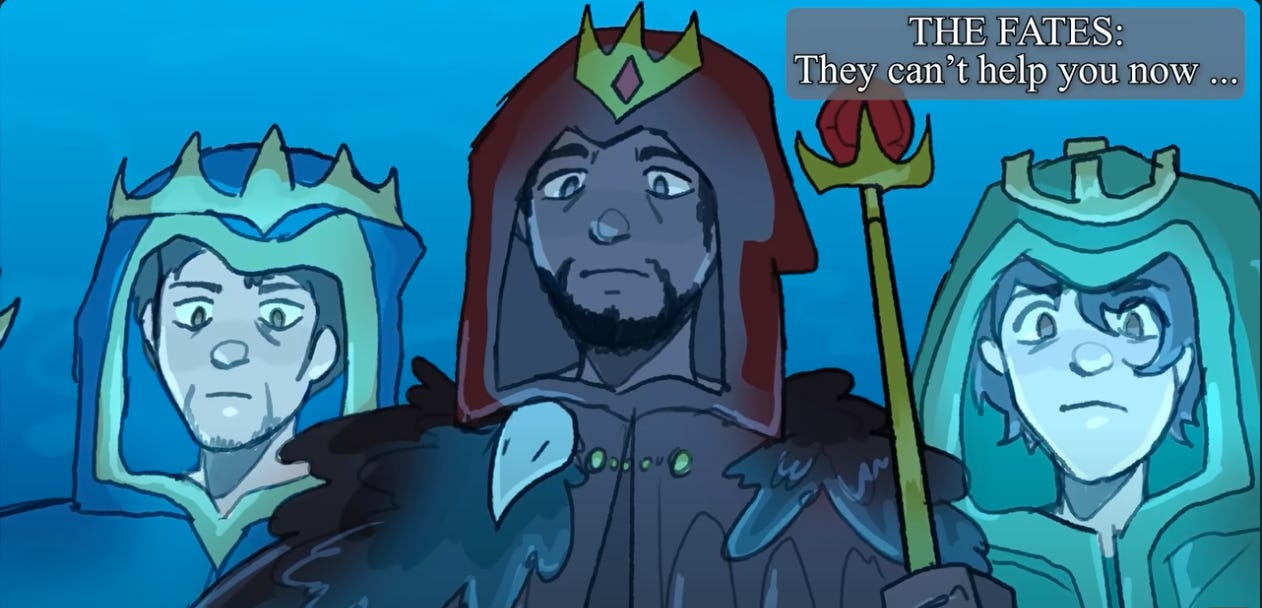





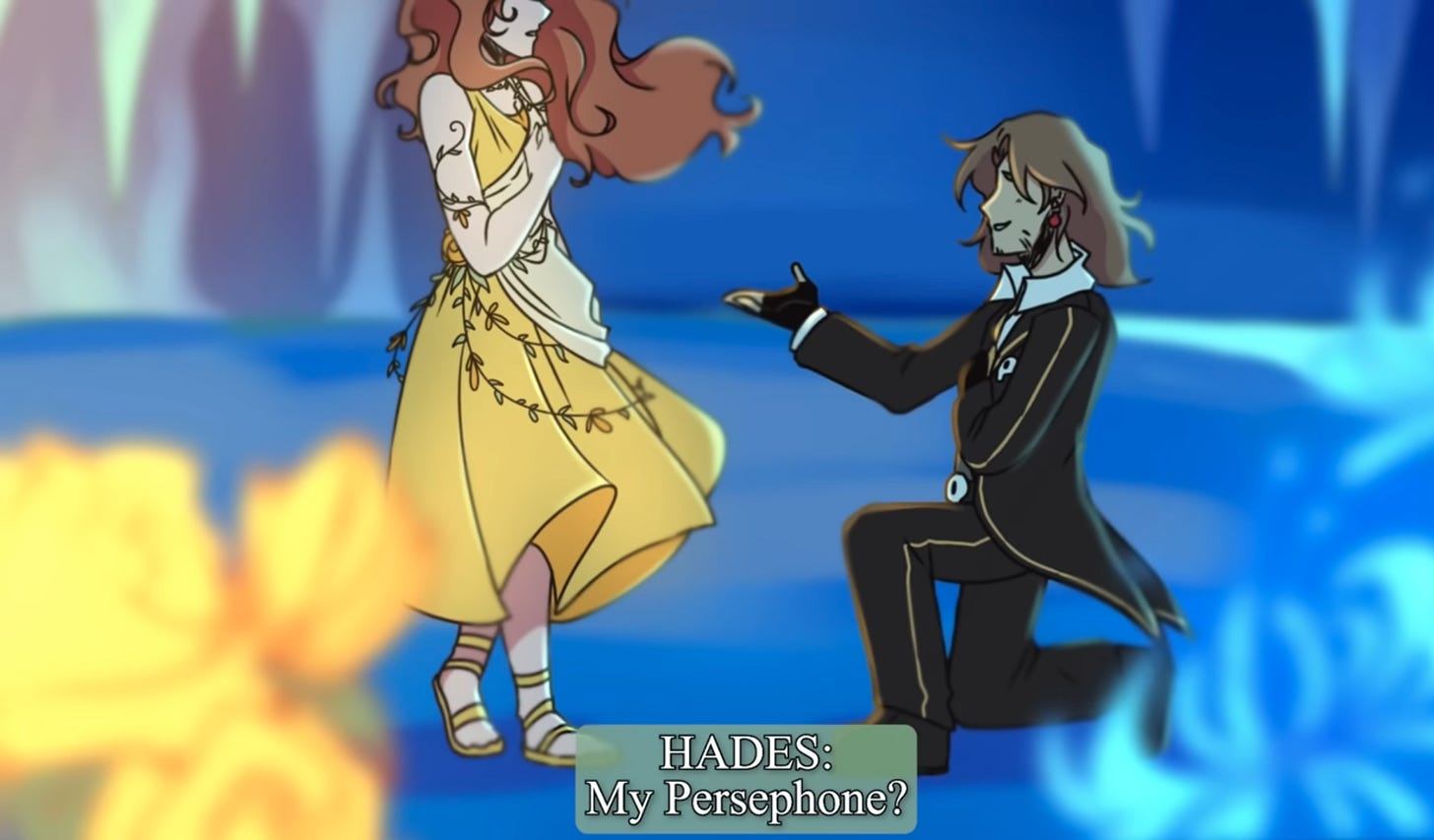









the first art included from sfs is credited incorrectly; it says ElianZis while it is Kris/Julsunart who made the headshot images
That art with the 6 god cards isn't by elianzis, it's by julsunart!!!! Please credit them properly!!!